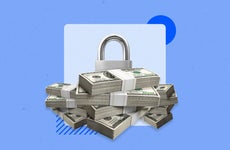
The Bankrate promise
At Bankrate we strive to help you make smarter financial decisions. While we adhere to strict , this post may contain references to products from our partners. Here's an explanation for .
Our writers and editors used an in-house natural language generation platform to assist with portions of this article, allowing them to focus on adding information that is uniquely helpful. The article was reviewed, fact-checked and edited by our editorial staff prior to publication.
Key takeaways
- CDs issued at federally insured banks and credit unions are protected by federal deposit insurance, meaning your money is protected up to $250,000 per depositor, per insured institution, per ownership category.
- CDs from online-only banks can be just as safe as CDs from brick-and-mortar banks, as long as the online bank is federally insured and takes basic security measures.
- CDs can be a smart choice for your savings strategy, especially in a rising interest rate environment, or when yields are outpacing inflation, but it's important to consider your financial goals and timeline for accessing the funds.
- One way to lose money in a CD is if you withdraw money before its maturity date and are hit with an early withdrawal penalty, potentially causing a loss of interest and even a portion of the principal amount.
Certificates of deposit (CDs) are accounts that typically pay a guaranteed rate of return for a set period of time. CDs come with a wide range of terms and interest rates, but all CDs share one common component: They are one of the safest places to park your cash.
Federal insurance keeps CDs safe
Like savings and checking accounts, most CDs are protected by deposit insurance, meaning your funds are insured by the Federal Deposit Insurance Corp. (FDIC) at a bank and the National Credit Union Administration (NCUA) at a credit union.
“That insurance is there in case a bank runs into financial trouble, which doesn’t actually happen all that often,” says David Sterman, CFP, president and CEO of New York-based Huguenot Financial Planning. “However, such insurance only covers $250,000 per account. If someone has more than $250,000 that they would like to invest, then it is wise to open accounts with several banks or open several accounts at the same bank. For example, one CD could be owned by one spouse and the other CD owned by the other spouse at the same bank. Each account would have $250,000 in insurance on them,” Sterman adds.
To be sure that your CD’s funds will be insured, you can use the FDIC’s BankFind tool to look up the institution and verify it is part of the FDIC’s network. Likewise, the NCUA offers a Research a Credit Union tool that provides credit union details and verifies insurance.
How safe are online CDs?
In addition to brick-and-mortar banks, CDs are commonly offered at online-only banks. Because online-only banks don’t have branches, they require you to open accounts online and deposit money electronically.
Using an online bank for CDs and other deposit accounts can be just as safe as using a brick-and-mortar bank, as long as the online bank is federally insured and takes basic steps to protect your information, such as:
- Encryption: Encryption technology can protect your username, password and other information. You’ll know it’s in place when there’s a lock symbol next to the bank’s web address in your browser.
- Multi-factor authentication: This two-step process can add a layer of security by sending you a text with a code that you’ll use to log in.
A bonus of CDs from online banks is they often earn a higher annual percentage yield (APY) than those offered by brick-and-mortar banks.
“To get the best CD yields, you may need to shop online as local bank branches may not offer the market-leading yields, though it pays to inquire at your local bank branch and compare,” Sterman says. “Those online CD vendors, such as Ally or Capital One, carry the same FDIC insurance, so there is no risk in banking with them.”
Why should you think about opening a CD?
In addition to ensuring a CD is safe, it’s important to determine whether it’s a good place to stash your money, based on your financial goals.
The Federal Reserve raised interest rates 11 times in 2022 and 2023. The rates on many CDs increased incrementally following these Fed rate hikes.
In an environment of steady or rising rates, opening a CD can be a smart move depending on your financial goals and timeline. You should consider your goals for the money you’re placing in the CD, including when you’ll want access to the funds.
“Using a CD to save for retirement is not a great idea since you may not need the money for decades,” says Chris Reddick, CFP, and owner of Texas-based Chris Reddick Financial Planning. “But if you want to buy a new car or other big purchase in a year or so it might be best to get a CD.”
Huguenot Financial Planning’s Sterman says CDs are often a great place to set aside funds that won’t be needed for a year or two. “They’ll garner more interest than a regular checking or savings account would, and unlike the stock market, you’re assured that the money will be there when you need it.”
Consider inflation when opening a CD
The rate of inflation peaked to 9.1 percent in June 2022, which was the highest rate since November 1981. Since then, however, inflation has come down to 3.4 percent.
Meanwhile, yields on CDs peaked in late 2023, and they’re still well above inflation, making them worth considering by savers who want to lock in a high rate.
“Any time you can lock in a CD at a return that is above the rate of inflation, you have to consider it,” says Greg McBride, CFA, Bankrate chief financial analyst. “Just be sure to only commit to a CD where you are certain you don’t need the money until maturity.”
To maximize CD interest earnings, savers would do best to select one that pays a significantly higher yield than the national average, which often means opening a CD with an online-only bank. Without the expense of maintaining branches, online banks may pass along the savings to customers in the form of higher rates.
Relatively safe alternatives to CDs include money market accounts and low-risk mutual funds — as well as Treasury Inflation-Protected Securities, or TIPS, which have an effective interest rate that moves up or down along with inflation.
Can you lose money on a CD?
CDs are typically regarded as secure investments, although you can indeed lose money under certain circumstances. If, for example, you decide to withdraw from a CD prior to its maturity date, you’ll likely be hit with an early withdrawal penalty. This could equate to several months’ worth of interest. In some cases, the penalty could potentially surpass the interest you’ve accumulated, leading to a reduction in your original deposit — effectively causing a loss.
However, as long as you comply with the CD’s requirements until it matures, and your CD provider carries federal deposit insurance, your money is protected up to $250,000 per depositor, per insured bank or credit union, per ownership category.
What if I need to withdraw my money early from a CD?
Withdrawing from a CD before its maturity date usually incurs a penalty, which is often the loss of interest that the CD has accrued over a certain period. This penalty can vary among banks and is generally influenced by the term length of the CD; those with longer terms are likely to have steeper penalties than those with shorter terms.
If you withdraw your money from a CD too early, the penalty might even dip into the principal amount, resulting in the loss of a portion of your original deposit. It’s important to note that most banks don’t permit partial withdrawals, so accessing the money early would mean forfeiting the remaining potential interest, on top of paying the penalty.
Ways to avoid paying a CD’s early withdrawal penalty include only devoting money to a CD that you’re comfortable parting with for the entire term. Alternately, you could opt for a no-penalty CD, or deploy a CD ladder strategy which allows access to some of your funds at intervals.
Bottom line
CDs are one of the safest ways to store money and earn a set rate of interest, which can help you better plan your finances. CDs opened at FDIC-insured banks, or credit unions backed by the NCUA, are guaranteed by the federal government. Should the bank or credit union fail, your savings won’t be lost, as long as you’re within deposit limits.
–Freelance writer David McMillin contributed to a previous version of this article.
Related Articles



